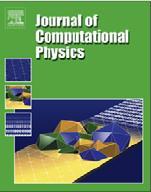- Home >> News >> Research Progress
Research Progress
A Smoothing Technique for Discrete Delta Functions with Application To Immersed Boundary Method in Moving Boundary Simulations
 The effects of complex boundary conditions on flows are represented by a volume force in the immersed boundary methods. The problem with this representation is that the volume force exhibits non-physical oscillations in moving boundary simulations. A smoothing technique for discrete delta functions has been developed in this paper to suppress the non-physical oscillations in the volume forces. We have found that the non-physical oscillations are mainly due to the fact that the derivatives of the regular discrete delta functions do not satisfy certain moment conditions. It has been shown that the smoothed discrete delta functions constructed in this paper have one-order higher derivative than the regular ones. Moreover, not only the smoothed discrete delta functions satisfy the first two discrete moment conditions, but also their derivatives satisfy one-order higher moment condition than the regular ones. The smoothed discrete delta functions are tested by three test cases: a one-dimensional heat equation with a moving singular force, a two-dimensional flow past an oscillating cylinder, and the vortex-induced vibration of a cylinder. The numerical examples in these cases demonstrate that the smoothed discrete delta functions can effectively suppress the non-physical oscillations in the volume forces and improve the accuracy of the immersed boundary method with direct forcing in moving boundary simulations.
The effects of complex boundary conditions on flows are represented by a volume force in the immersed boundary methods. The problem with this representation is that the volume force exhibits non-physical oscillations in moving boundary simulations. A smoothing technique for discrete delta functions has been developed in this paper to suppress the non-physical oscillations in the volume forces. We have found that the non-physical oscillations are mainly due to the fact that the derivatives of the regular discrete delta functions do not satisfy certain moment conditions. It has been shown that the smoothed discrete delta functions constructed in this paper have one-order higher derivative than the regular ones. Moreover, not only the smoothed discrete delta functions satisfy the first two discrete moment conditions, but also their derivatives satisfy one-order higher moment condition than the regular ones. The smoothed discrete delta functions are tested by three test cases: a one-dimensional heat equation with a moving singular force, a two-dimensional flow past an oscillating cylinder, and the vortex-induced vibration of a cylinder. The numerical examples in these cases demonstrate that the smoothed discrete delta functions can effectively suppress the non-physical oscillations in the volume forces and improve the accuracy of the immersed boundary method with direct forcing in moving boundary simulations.
This paper was published as:
Yang XL, Zhang X, Li ZL, He GW. A smoothing technique for discrete delta functions with application to immersed boundary method in moving boundary simulations. Journal of Computational Physics,228(20):7821-7836(2009)
